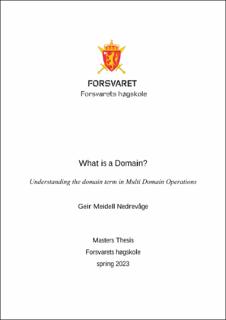| dc.description.abstract | There is an ongoing debate as to carry out Multi-Domain Operations and how to best prepare your force for it and implement the concept. However, neither the domain term itself, nor MDO as a resulting construct is unitarily understood among the participants in the debate. To contribute to this debate, this thesis poses the following three research questions.
1. How is the term Domain understood in the current MDO debate?
a. What, if any variation has there been in the understanding of the Domain concept since
MDO was launched as a concept in 2016/17?
2. Is there a correlation in the understanding of the Domain term and the understanding of the MDO concept? Is there a causal link between the understanding of the term and the understanding of the concept? If so, what is the dependent and what is the independent variable?
3. How can these relations, and their attendant understandings of MDO, affect small and medium states, with Norway as an example?
By conducting a literary review of openly available government publications, primarily from the US, UK, NATO, and Norway, combined with different articles and contributions to the debate, a picture of the various interpretations and their implications can be painted. It is quickly apparent that the domain term is far from unitary in its understanding, but the origins and implications of the various interpretations are less clear. In addition, the variation does not appear to follow any set geographical, organisational, or chronological lines within the timeframe addressed, primarily from 2016 up until today.
Furthermore, variations in the understanding or usage of the domain term appears to correlate with the understanding of MDO. However, the direction of a possible causal link, or if both are dependent on another variable cannot be ascertained with any degree of confidence from the available source material. This would seem to indicate that there may be several different relationships between the variables, depending on the writer in question.
Based on this apparently fractured understanding of both the domain term and MDO as a concept, navigating the security environment becomes challenging for small states such as Norway. This is primarily because the various interpretations lead to significantly different adaptations of one’s posture and policy, with several of the adaptations having the potential of being mutually exclusive. In total this shows that the apparent lack of a common understanding of the terms and concepts discussed in this debate contributes to potential misunderstandings in aligning both force structure, doctrine, and general security policy. Given the potential cost associated with investing in the “wrong” structure or approach, this ambiguity is especially troubling for smaller states such as Norway with V relatively limited capacity to pursue multiple tracks of development and force structure. However, given the varying points of view and perspectives involved, a unitary understanding of the term and the concept is unlikely. It is therefore imperative that one is mindful of the perspectives of the various participants when trying to make sense of the debate. | en_US |
